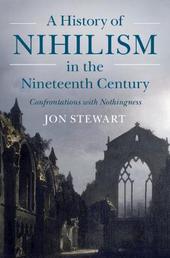
|
A History of Nihilism in the Nineteenth Century: Confrontations with Nothingness
Hardback
Main Details
| Title |
A History of Nihilism in the Nineteenth Century: Confrontations with Nothingness
|
| Authors and Contributors |
By (author) Jon Stewart
|
| Physical Properties |
|
| ISBN/Barcode |
9781009266703
|
| Audience | |
|---|
| Illustrations |
Worked examples or Exercises
|
|
Publishing Details |
| Publisher |
Cambridge University Press
|
| Imprint |
Cambridge University Press
|
| NZ Release Date |
31 August 2023 |
| Publication Country |
United Kingdom
|
Author Biography
Jon Stewart is a Research Fellow in the Institute of Philosophy at the Slovak Academy of Sciences. He is the author of many books, most recently An Introduction to Hegel's Lectures on the Philosophy of Religion: The Issue of Religious Content in the Enlightenment and Romanticism (2022) and Hegel's Century: Alienation and Recognition in a Time of Revolution (Cambridge University Press, 2021), which was the Philosophy category prizewinner in the 2021 PROSE Awards.
Reviews'Jon Stewart's A History of Nihilism in the Nineteenth Century presents a remarkable new interpretation of the development of thinking about the problem of the meaninglessness of the human condition that is referred to as nihilism. This concept is usually associated with twentieth-century existentialism, but Stewart traces how the crisis of meaning arose far earlier, namely as a result of the development of Enlightenment science which undermined traditional religious belief. Insight after insight is gained into the different dimensions of nihilism by means of close readings of key thinkers and writers of the nineteenth century. In experiencing the amazing amplitude of scope of the source-critical work and the creative interpretive turns that come as the narrative unfolds, one senses being in the presence of an author of significant humanity and erudition.' Curtis L. Thompson, Thiel College 'A History of Nihilism in the Nineteenth Century delivers a comprehensive, balanced survey of the leading philosophical and literary attempts to grapple with the concept of nothingness. Stewart's erudition is on full display as he sheds new light on well-known theorists of nihilism, e.g., Schopenhauer, Nietzsche, and Turgenev, while elevating the contributions of neglected figures, e.g., Klingemann, Buchner, and Moller. Students and scholars alike will appreciate Stewart's clear, engaging, and jargon-free exposition of one of the defining ideas of the nineteenth century. An impressive achievement by any measure.' Daniel Conway, Texas A&M University
|